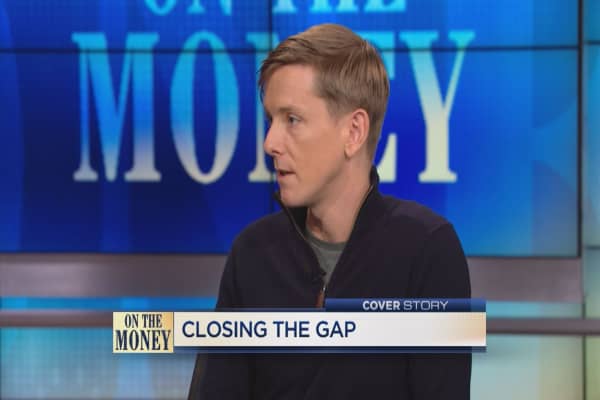Forty-eight percent of Americans support a universal basic income.
Longtime advocates say we're closer than ever to adopting the program.

What is universal basic income? 1:49 AM ET Thu, 28 Dec 2017 | 04:22
Political philosopher and economist Karl Widerquist, an associate professor at Georgetown University in Qatar, remembers a poll from 10 years ago that showed just 12 percent of Americans approved of a universal basic income.
That's changed — and quickly. Today, 48 percent of Americans support it, according to a new Northeastern University/Gallup survey of more than 3,000 U.S. adults.
"It represents an enormous increase in support," said Widerquist, who is a well-known advocate for a universal basic income. "It's really promising."
Proposals for universal basic income programs vary, but the most common one is a system in which the federal government sends out regular checks to everyone, regardless of their earnings or employment.
Pilots of such programs are underway in Finland and Canada. In rural Kenya, a basic income is managed by nonprofit GiveDirectly. India — with a population of more than 1.3 billion residents — is consideringestablishing a universal basic income.
"People are saying, 'Look we cannot let inequality continue to grow because the political consequences could be a disaster.'"-Guy Standing, co-founder of the Basic Income Earth Network
Some projects are happening closer to the U.S.
Y Combinator Research, based in Oakland, California, started a test of a basic income last year, and is raising funds to expand the research project. This year in Stockton, California, Mayor Michael Tubbs's Stockton Economic Empowerment Demonstration will give several dozen low-income families $500 each month in a study of basic income. And for decades, Alaska residents have each received around $2,000 a year from the Alaska Permanent Fund.
These examples are an opportunity to debunk many of the myths about a universal basic income, said Guy Standing, co-founder of the Basic Income Earth Network. He recently spoke at the World Economic Forum in Davos, Switzerland, on the subject.
"The claim is often made that if you give people a basic income, they'll become lazy and stop doing work," Standing said. "It's an insult to the human condition. Basic incomes tend to increase people's work rather than reduce it."
That's because research has shown that a basic income can improve people's mental and physical health, Standing said, as well as encourage them to pursue employment for reasons more meaningful than just a need to put food on the table.
Rising inequality, and its vast effects, have triggered a "perfect storm" for basic income, Standing said.
"People are saying, 'Look we cannot let inequality continue to grow, because the political consequences could be a disaster'," Standing said, pointing to the recent rise of more authoritarian figures.

Sharing the wealth 5:24 PM ET Fri, 23 Feb 2018 | 04:05
Even amid a booming economy, wage-growth has been sluggish. At the same time, the list of jobs robots are able to fill is growing more impressive (and perhaps worrisome). The Northeastern University/Gallup survey showed that three quarters of Americans believe machines will take away more jobs than they'll generate.
"We don't need to threaten people with homelessness and poverty to get them to work," Widerquist said. "It's capitalism where income doesn't start at zero."
Still, the survey found that 52 percent of Americans do not support a basic income. The idea is more popular with certain groups.
For example, 65 percent of Democrats want to see a universal basic income, and 54 percent of people between the ages of 18 and 35 do. In comparison, just 28 percent of Republicans support universal basic income.
"Anything that sounds like welfare gets a much more negative reaction from Republicans," said Frank Newport, editor-in-chief of Gallup.
Newport said he found it interesting that the public doesn't necessarily want the government to pay for the universal basic income. Instead, 80 percent of supporters say that the companies that benefit from artificial intelligence should pay the higher taxes to fund a basic income.
Standing said Americans might be receiving those checks sooner than previously thought, thanks to the realization of what could follow if they never came.
"You can't have a free market economy if people are constantly insecure," Standing said. "You can't expect them to be rational."
The liberal stupidity never ceases to amaze me. Its still welfare.
ReplyDeleteAnother democratic scheme to make you dependent upon the government, the beginning of the end.
ReplyDelete